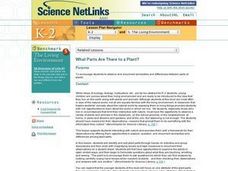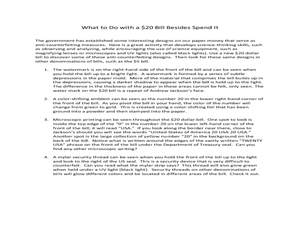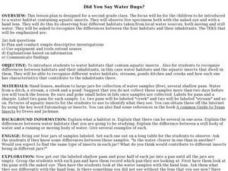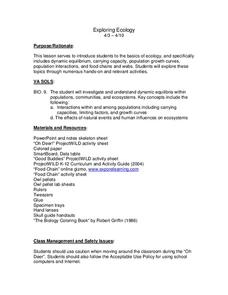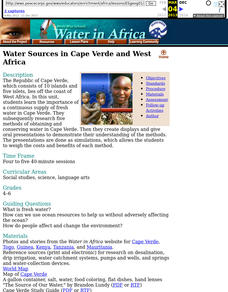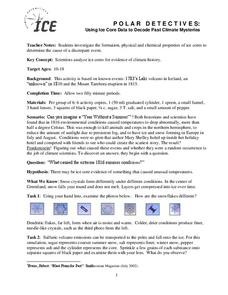Curated OER
Hey, Look Me Over!
Students make observations about mealworms using hand lenses, rulers, and cotton swabs. Students complete their own mealworm observation chart, then they share their observations with the class. This is one station out of five in an...
Curated OER
Living Organisms
Third graders examine pond water samples using hand lenses while working in small groups. They find specimens of living organisms in the water samples. Finally, the draw a picture of the organisms and label them using descriptive...
Curated OER
What Parts Are There to a Plant?
Learners identify and sort plant parts through hands-on activities and group discussions and then work with magnifying lenses and tape measures to document their observations on a student sheet.
Curated OER
Zoom into Microscopy
Students discover proper microscope use. In this microscopy lesson, students create picture books that show the detail of organisms as seen with the human eye, through a hand lens, and at each power of the microscope.
Curated OER
This is Your Rock, This is My Rock
Students study the identity of rocks and minerals that can be found in Utah. They examine the characteristics that identify the rocks and minerals by using a hand lens and write them down on an index card. They role play as detectives by...
Curated OER
Investigation 3 - Examining Your Fossil
Fourth graders examine the fossils they made previously. They examine the details of the fossil with a hand lens and come up with conclusions about the fossils. They record what they see and draw conclusions about the environment of the...
Curated OER
Does the increased use of fertilizers effect biodiversity?
Students conduct a hands-on lab activity in which they analyze a sample of water from a local stream or pond. They introduce a fertilizer solution into the sample and analyze and describe their findings.
Curated OER
What to Do with a $20 Bill Besides Spend It
Students explore the concept of anti-counterfeiting measure. In this economics lesson, students use science equipment to discover anti-counterfeiting designs. Students then explore other denominations of bills.
Curated OER
Scales, Scutes, and Skins
Students identify the various adaptations of reptiles and amphibians. After distinguishing between reptiles and amphibians, students discuss the ways in which their adaptations aid in their survival. They participate in a hands on...
Curated OER
Scales, Scutes, and Skins
Students identify the various adaptations of reptiles and amphibians. After distinguishing between reptiles and amphibians, students discuss the ways in which their adaptations aid in their survival. They participate in a hands on...
Curated OER
20/20 Vision
Students determine their own eyesight and calculate what a good average eyesight value for the class would be. They examine how technology enhances eyesight and how engineers play an important role in the development of these technologies.
Curated OER
Magnify That
Learners observe many different objects using a magnifying lens. In this magnification lesson plan, students learn that scientists use different tools, and they use the tool to magnify objects in the classroom to see objects in better...
Curated OER
Did You Say Water Bugs?
Second graders observe live specimens of aquatic insects in a water habitat. They study specimens from both moving and still water with the naked eye and a hand lens.
Curated OER
Exploring Ecology
Students explore the basics of ecology through numerous hands-on and relevant activities. They participate in an online food chain demonstration, which explores food web dynamics. They dissect owl pellets, examine the prey's bones, and...
Curated OER
Water Sources in Cape Verde and West Africa
Young explorers study the scarcity and importance of a continuous supply of fresh water in Cape Verde. They research the five main ways that fresh water is obtained in these countries. Each research group prepares a presentation, and...
Curated OER
Cycles and Starting Mealworms
Here is a fascinating lesson about the life cycles of plants and animals, and other cycles found in nature. Learners explore the cycle of the moon, the tides, and other sequences of events in every day life. The big activity is the...
Curated OER
Finding, Gathering, Saving Seeds
Young scholars understand the importance of saving seeds. In this saving seeds lesson, students dry out seeds for later use planting. Young scholars recognize that one plant may have many seeds.
Curated OER
Living-Nonliving
Students determine that environments have living and nonliving parts. They discuss what makes something a living thing and something a nonliving thing. They make a chart and list characteristics of living things and nonliving things.
Curated OER
Energy Resources: Where Are They and How Do We Get Them?
Future energy engineers visit several stations, each one dedicated to a different alternative source of energy. They describe how solar energy is converted into other forms of energy, the patterns of distribution of energy resources in...
Curated OER
Pond Ecology
A lab activity is a great way to incite thoughtful questioning and scientific processes. Pupils will collect organisms with a Petri dish, make observations, sketch the organism, ask questions, then attempt to identify the specimen...
Curated OER
Aquatic Science
What a terrific way to explore the pond habitat! Learners discuss the animal and plant life found in the Long Island area. They also discuss vocabulary terms, identify pollution concerns, and resource conservation.
Curated OER
Mealworms
Crawl into the world of the darkling beetle with this scientific investigation. Watch as the insects move through the larval, pupal, and adult stages of life, recording observations along the way. Discuss the necessities of life as young...
Polar Trec
Polar Detectives: Using Ice Core Data to Decode Past Climate Mysteries
How does examining an ice core tell us about weather? Learners set up and explore fake ice cores made of sugar, salt, and ash to represent historical snowfall and volcanic eruptions. From their setups, scholars determine what caused the...
Curated OER
F.B.I.
Students create a worm bin full of fruit and vegetable scraps wit paper and observe what happens over time. In this decomposers lesson plan, students observe that the fruit and vegetable scraps become new soil.




